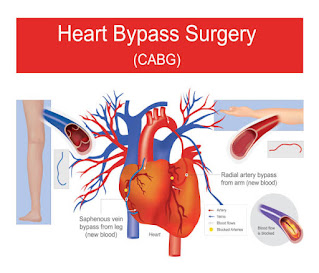What is heart attack:
This blog is about heart attack and we will discuss different symptoms, causes, and treatment of heart attack. When something blocks blood flow from our heart then heart problems happens. This is because our heart does not get enough oxygen according to its needs. We can also say heart attack is a myocardial infarction. According to research, more than one million Americans experience a heart attack every year. We say this problem as myocardial infarction because ‘Myo’ means muscles and we say 'cardial' as heart and ‘infraction’ is the death of tissues of the heart because of a lack of blood supply to heart muscles. The death of heart tissues causes lasting damage to our heart muscles.
Heart attack symptoms:
Its includes the following symptoms:
- A heart patient experiences pain in the chest, arms, and below the breastbone
- A patient with a heart problem experiences pressure, discomfort, squeezing, and tightness in their chest.
- A heart patient also experiences a choking feeling, like heartburn.
- Indigestion is also a symptom in a patient with a heart problem.
- Severe sweating, indigestion, upset stomach dizziness, and vomiting, these symptoms are common in a heart patient.
- A heart patient also feels an uneven and fast heartbeat.
Symptoms of a heart attack may vary from patient to patient. These symptoms are most common in women with heart problems.
Angina is a symptom of heart disease. It signals a heart attack. A patient with a heart problem can feel this sensation normally during normal activities. Patients with heart problems may feel pain, pressure, a sense of fullness, and squeezing in the center of their chest. Angina is a serious condition and a patient should have to immediately consult a doctor.
Heart attack causes:
A constant supply of oxygen-rich blood is needed for our heart. This critical blood supply is given to our heart by the coronary arteries. These arteries become narrow when we have coronary artery disease and blood flow does not remain as constant as it should. When our blood supply is blocked, we have a heart attack. When proteins, calcium, fat, and inflammatory cells are grown up in our arteries and they form plaques. These plaque deposits are hard on the outside of arteries and they are soft on the inside of arteries. The outer shell of arteries is cracked, when plaque is hard and this is a rupture.
Platelets which help in blood clotting and are disk-shaped come to this area and form a blood clot around the plaque. Our heart muscles become starved for oxygen when a blood clot blocks our artery. This condition leads to a heart problems.
Blood is supplied to different parts of the heart muscles by each coronary artery. After a heart attack, our heart muscles heal quickly. Like skin, wound heart muscles take 8 weeks to heal, but the new scar tissues do not work as they should. So after a heart attack, our heart could not pump as much.
Treatment of heart problems:
This is a severe condition and to prevent permanent damage and death we need immediate care. We should have to take medicines within 1 to 2 hours from the start of heart damage. This immediate medication limits heart damage.
- Aspirin should be used to stop blood clotting.
- Another anti-clotting drug used during a heart attack is clopidogrel. This medicine is also an option used to prevent blood clot formation in arteries.
- Thrombolytic therapy is also used to treat a blood clot in our heart arteries.
Stent placement, Balloon angioplasty, Cardiac catheterization, and Bypass surgery are some other treatments for preventing heart damage.

.jpg)




